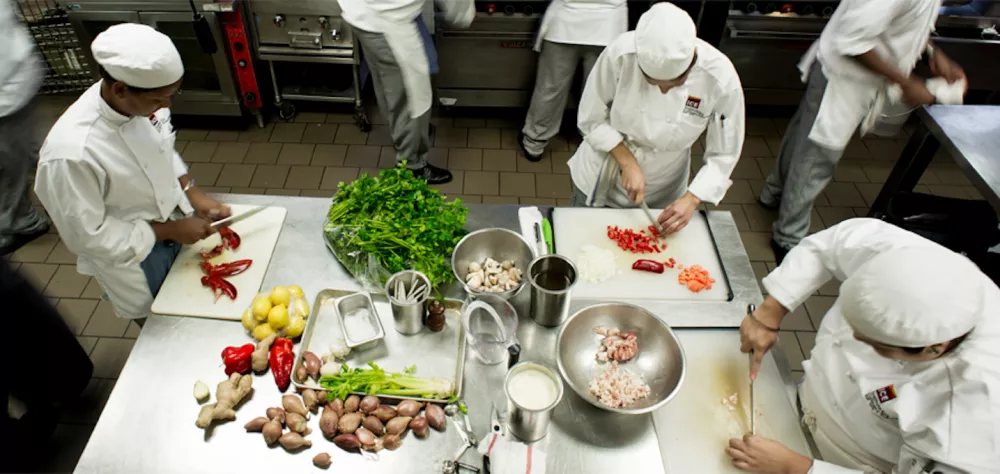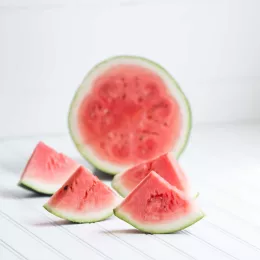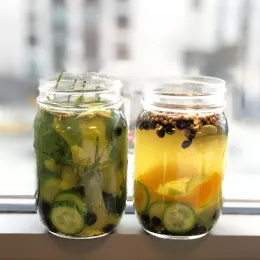Throughout the past 20 years, the “food scene” has emerged as an integral part of popular culture. Chefs have gone from hiding behind closed kitchen doors to serving as the restaurant’s main attraction. Gone are the days of dinner and a show. Today, dinner has become the show. Restaurant reservations are badges of honor and every year, more and more sauté pans flash and sizzle on your television screen. Even feature films are increasingly set in the kitchen!

In my personal experience as a chef, the public’s growing interest in food has created professional opportunities that I never imagined when I started cooking in 1996—from appearances on competitions like Chopped! to teaching America cooking tips on the Today Show. However, for those entering the industry as newcomers, these shows often fail to reveal the day-to-day grind of the kitchen, a slow and steady process of career growth that takes years—not merely 12 episodes. Today, as a chef and a culinary educator with one foot firmly in both the pre- and post- television food scene, I’d like to share a few thoughts on choosing a career in the kitchen.
Be driven, but patient.
Kitchen hours are tough, and it’s nowhere near as glamorous as it looks on TV. Working in a restaurant is the original “standing desk”—you’re going to spend 10-12 hours on your feet everyday. (Not to mention that you may focus on a single task for 4-6 hours at a time.) Cooking is fun, but kitchen work can be tough. As you stand there, hand aching from gripping your knife and feet throbbing, just remember that you’re part of a unique community—one cook among millions of chefs that have endured the same grueling hours and seemingly endless tasks.
As a teenager on the Florida Gulf Coast, I can recall standing at a deep stainless steel sink in the back of a hot kitchen, peeling one hundred pounds of shrimp at time. By the time I was finished, my hands were cramped, wrinkled and in pain (from getting stabbed by the shrimps’ sharp spines). On the surface, it may not seem like there is much to learn from peeling that much shrimp. But as I worked, I watched the line cooks (after a while you learn to peel shrimp without even looking at them). I kept my ears open and learned the language of the kitchen. Without my realizing it, those hours at the shrimp sink were the ultimate preparation for line cooking. Soon enough, I was glancing over the back of the stove to see another guy peeling the shrimp. Though he may have thought he was going nowhere, I knew he would be standing next to me before long.
Learn how to hustle.
The secret to any chef’s success? Learn how to work faster and with more precision than everyone around you. Then ask what else you can do. Take pride in chopping another cook’s mise en place because you came into the kitchen with a plan, while they came in with a hangover. These are the traits that are going to earn the respect of your chef.
When I became sous chef under Frank Stitt at Highlands Bar & Grill in Birmingham, Alabama, it wasn’t because I was the best cook in the kitchen. In fact, I was the youngest and had been working there for less time than anyone else on staff. But, I worked harder.For example, I put in extra hours assisting the pastry chef, because I wanted to learn to bake. I asked Chef Stitt for a reading list and devoured the books in my spare time. I couldn’t wait to get into the kitchen to talk about what I had read the night before.
Learning to “hustle” is a critical skill for young chefs. There’s a theory that states “the time required to complete a given task will expand or contract to fill the time allotted for that task,” and generally I find it holds true. But to stand out in a kitchen full of eager young cooks, there’s no such thing as “enough”—you need to do more than anyone else around you.

Say “Yes, chef.”
In the early years of your career, your job is to work and to learn. You should never be afraid to ask a question in the kitchen, but don’t—especially as a young cook—question your chef’s authority. Two simple words—yes, chef—convey a lot: respect, understanding and willingness. First and foremost, the phrase is a sign of respect. Secondly, it acknowledges that you have heard the direction that was given. Yes, there may be a little voice in your head saying, “Seriously? 30 pounds of minced onion? What could we even need 30 pounds of freaking onions for?” But your mouth should always say “Yes, chef.” And if you truly believe there’s no way 30 pounds are actually needed, bring your chef 15 pounds of onions as fast as you can and say, “Here are 15 pounds, I’ve got the rest coming right now.” If you’re lucky, your chef will say, “This is plenty, don’t worry about the rest.”
Master the classics.
All great chefs are history buffs. I’m as happy digging through old copies of Escoffier, Bocuse and Olney as my Dad is lying on the couch in front of World War II documentaries. It may sound crazy, but classic books are often where new ideas are born. It could be a specific combination of ingredients, the way something is plated or a technique you imagine applying to an unexpected set of ingredients. Inspiration can only come from experience, so empower yourself to be more creative by improving your understanding of dishes that have stood the test of time.
Would Thomas Keller have come up with his famous Oysters and Pearls if not for Escoffier’s Hot Oysters with Champagne Sabayon? Could Alain Senderens’ Canard Apicius ever come to be without, well Apicius (the oldest known cookbook from ancient Rome)? Or would we ever have made it to Michel Bras’ Le Gargouillou if Michel Guérard’s Salade Gourmande had not come first? (If you did not immediately recognize any of the dishes, researching them is a great place to start.)
 Respect everything—and everyone—in the kitchen.
Respect everything—and everyone—in the kitchen.
A good kitchen is a living, breathing machine that consists of people, equipment and product. To be successful, you have to learn to respect all three. When I worked for Daniel Boulud, no one (not even Daniel) started working before saying hello, bonjour or como estas to every person in the kitchen. It may seem like an unnecessary gesture, but it reminded us that we were all there together.
First and foremost, you have to respect your colleagues. Swallow your pride and remember that the dishwasher who has worked there for three years knows more about how your kitchen runs than any new line cook. Sure, you understand the perfect construction and timing for a braise, but he knows exactly how chicken bones will fit in the stockpot and just how big of a pan of mirepoix you need to cut. You can learn from everyone in the kitchen—don’t forget that.
Never stop learning.
Learning to be a great chef—a process that continues long after you graduate from culinary school—takes time, patience and dedication. You will likely spend weeks (if not longer) learning to make soup or how to properly dress a salad. Most cooks work in a kitchen for at least two years before they get to plate the coveted “cover dishes” (the beautiful plates that grace magazine covers or Instagram accounts). Be patient, pay attention and remember that you have opportunities all around you. The best chefs are the ones that figure how to make the most of every task or experience.




